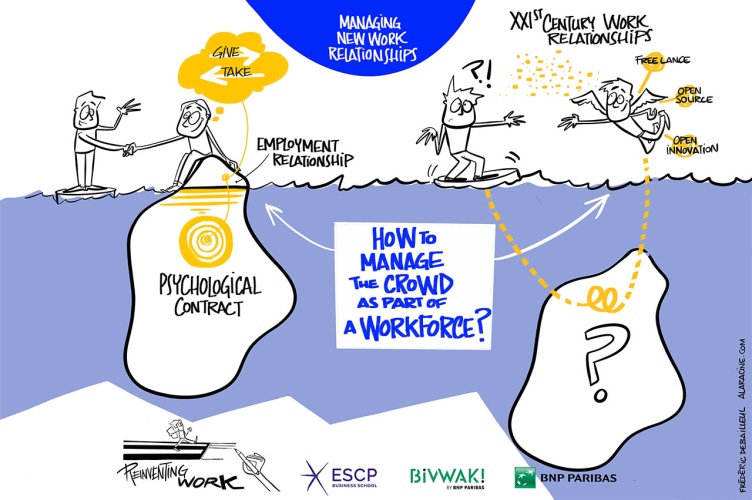Psychological contract and new work relationships A fascinating project launched in January 2021
Research context
Open-source software is a computer program that has traditionally been built by volunteers. These volunteers donate their time and effort to collaborate in developing code and documentation, which they make available to other developers who can, in turn, share and modify them.
Open source development has increased in many countries, with a recent study suggesting that the passing of a French law promoting open source led to an increase of 600 000 yearly contributions.
Open source participants are interesting to study because they are often used as an example of new forms of digitized independent work, carried out by "the crowd". Drawing on them, this project seeks to develop management theory to understand 21st-century work relationships, involving workers who are independent from the companies they contribute their work to.
Research question
Why do people contribute to open source and why do they stop? Being external to the organisation, how can they be managed?
Methodology and milestones
Construction of an archive of participant data (159 threads within 9000+ emails) in an open-source project that mixes paid employees and voluntary participants to understand the process by which contributors' participation evolves and may come to an end.
Reliance on psychological contract theory as the analytical lens.
Research team
- Almudena Canibano (ESCP, Madrid campus)
- Daniel Curto-Millet (University of Gothenburg, Sweden)
Research keytake aways
In open-source projects, participants hold multiple psychological contracts with different actors (the project / fellow developers/users).
Open-source participants stop or reduce their contributions when they experience psychological contract breach with any of these actors.
Participants expectations and psychological contracts interact. Experiencing breach with one actor can affect participants’ behaviours towards other actors.
To manage open source participants, it is essential to monitor their psychological contracts with all the different actors (project, developers, users).
12 Research projects
from the Reinventing Work Chair
By bringing together academics and professionals, the Chair facilitates renewed theoretical and practical views of the following key topics:
- Reshaping the work experience
- The role of agility to organise and change work
- Measuring the paradox of flexible working
- Psychological contract and new work relationships
- HR & digitalisation
- Talent sharing as a new development tool
- Technology-enabled interviews
- Shifts in expertise in the data science era
- Managing in geographically dispersed virtual organisations
- Virtual teams and well-being
- Meaning of work and self-organisation
- New contact centres & hybrid work (coming soon)
Key outcomes
External ecosystem
Shared research outputs / Awards and articles
Paper published:
Cañibano, A; Curto-Millet, D and Rojahn, L. (2022). Sustained participation in open source: A psychological contract approach. Hawaii International Conference on System Sciences Proceedings (HICCS). T. De Vreede, D. Kong, GJ De Vreede. (Eds). DOI: 10.24251 / HICSS.2022.093 [link]
Nominated to the Best Paper Award for the Track "Collaboration Systems and Technologies"
BNP Paribas internal ecosystem
"At BivwAk! we are experiencing new ways of working based on innovation and agile methodologies. Our pluridisciplinary team is composed of multiple types of contributions: internal and external. We regularly experience
extended collaboration with external partners (academics, act tanks, clients) with whom we share common projects and goals and only a psychological contract. This Research project is nourishing our thinking in continuously
improving our cooperation and work relationships.”
Marie Guillaume, Head of the transformation set-up BivwAk! by BNP Paribas
Campuses
